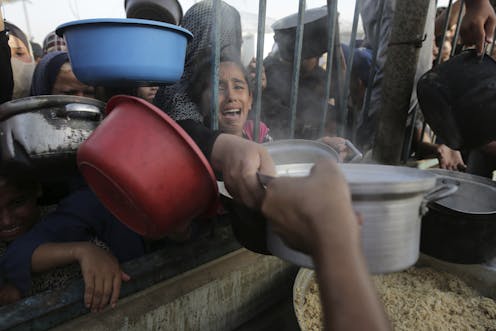
As Israel’s offensive in Gaza rages on, people across the entire Gaza Strip find themselves in increasingly dire circumstances, with nearly the entire population experiencing high levels of food insecurity, including malnutrition, hunger and starvation. A famine review analysis from the Integrated Food Security Phase Classification reported on June 25, 2024, that “a high risk of Famine persists across the whole Gaza Strip as long as conflict continues and humanitarian access is restricted.”
The Conversation asked Hasan Khatib, an expert in genetics and epigenetics, to explain the growing crisis in the Gaza Strip and what history lessons from earlier famines can teach us about the short- and long-term consequences of starvation, malnutrition and food insecurity.
Table of Contents
What is food insecurity and how widespread is it in Gaza?
Food insecurity refers to the lack of regular access to safe and nutritious food necessary for normal growth and development and maintaining an active, healthy life. Severe food insecurity is characterized by running out of food and going a day or more without eating, leading to the experience of hunger.
An initiative called the Integrated Food Security Phase Classification, or IPC, managed by United Nations bodies and major relief agencies, was established in 2004 to enhance analysis and decision-making on food security and nutrition.
The IPC classification system identifies five distinct phases of food security:
1. Minimal/none; 2. Stressed; 3. Crisis; 4. Emergency; 5. Catastrophe/famine.
The IPC estimates that 96% of the population in Gaza – 2.15 million people – are experiencing high levels of acute food insecurity, classified as IPC Phase 3 or higher.
Approximately 50% to 60% of buildings throughout Gaza, and over 70% of those in northern Gaza, have been damaged or destroyed, including more than 90% of schools and 84% of health facilities.
Due to the destruction of food production and distribution infrastructure, all households skip meals daily, with adults reducing their portions. The IPC projects that by July 2024, half of the population will be classified as being in a famine, experiencing acute malnutrition or death.
As of June 6, 2024, the World Health Organization reported that 32 patients had died from malnutrition and 73 had been admitted because of severe acute malnutrition in Gaza. Malnutrition can weaken the immune system, increasing the risk of serious illness and death, primarily due to infectious diseases.
And as of the same date, the WHO reported 865,157 cases of acute respiratory infections, 485,315 cases of diarrhea, 57,887 cases of skin rashes and 8,538 cases of chickenpox, all of which can be exacerbated by malnutrition.
How do stress and trauma add to hunger?
Strikes by the Israeli forces across the Gaza Strip have resulted in civilian casualties, the destruction of homes and the displacement of over 1.7 million people since October 2023, including many families who had already been displaced multiple times.
The United Nations Children’s Fund estimates that at least 17,000 children have been separated from their parents as of February 2024, and nearly all children in Gaza need mental health and psychological support. Symptoms observed among these children include heightened anxiety levels, loss of appetite, sleep disturbances and panic attacks.
Since Oct. 7, 2023, the United Nations Relief and Works Agency has provided critical psychological support, including psychological first aid, fatigue management sessions and individual and group counseling, to over 650,000 displaced persons, including 400,000 children.
UN Women, an organization focused on gender equality and the empowerment of women, reported that from October 2023 to April 2024, 10,000 Palestinian women in Gaza were killed, resulting in 19,000 children being orphaned. Approximately 50,000 pregnant Palestinian women and 20,000 newborn babies face limited access to health care facilities due to the bombardment of hospitals and health clinics.
In addition, more than 180 women per day are giving birth without pain relief, leading to a 300% increase in miscarriages due to the severe conditions. These dire conditions are causing severe stress and trauma among Palestinian children and women. This combination of stress, trauma and hunger can leave a lasting impact on both the women and their offspring.

AP Photo/Abdel Kareem Hana
What might the consequences be for future generations?
Over the past two decades, extensive research has investigated whether environmental factors such as hunger, stress and trauma can affect future generations that are not directly exposed to them. Pioneering studies of the Dutch famine, which occurred in the Netherlands from 1944 to 1945, found that these types of intergenerational effects were indeed happening.
During the Nazi occupation, food supplies were cut off from the western part of the Netherlands between November 1944 and May 1945, leading to widespread starvation. Decades later, researchers discovered that children and grandchildren of pregnant women exposed to the famine had a higher risk of health problems later in life, including cardiovascular disease, diabetes and other metabolic disorders.
Similarly, the Great Chinese Famine from 1959 to 1961, which resulted in an estimated 15 million to 40 million deaths, is one of the deadliest famines in history. It profoundly affected the physical and mental health, cognition and overall well-being of those exposed to it and their offspring.
Interestingly, our recent research into sheep demonstrated that paternal diet can alter traits such as muscle growth and reproductive characteristics, which can be passed down to two subsequent generations of sheep.
This inheritance of traits is mediated by chemical groups known as epigenetic marks. These epigenetic tags – known as DNA methylation or histone modifications – can originate from external sources, such as diet, or from within our cells. Histones are proteins that help organize and compact the DNA inside our cells.
These changes can control which genes are turned on or off. When exposed to hunger or stress, the epigenetic marks instruct our cells to behave differently, leading to altered traits. Remarkably, some of these epigenetic marks are inherited by offspring, influencing their traits as well.
Stress and trauma have been the focus of extensive research, particularly in understanding how extreme trauma can have biological effects that are transmitted to subsequent generations. Rachel Yehuda, an expert in psychiatry and the neuroscience of trauma, found that experiencing captivity or detention during the Holocaust was linked to elevated levels of epigenetic marks in a gene called FKBP5, which is involved in stress regulation. These epigenetic alterations were also observed in the children of Holocaust survivors.
Epigenetic changes can be reversible
Research shows that lifestyle and environmental factors play a significant role in influencing epigenetic marks. So positive changes in these areas can lead to the reversal of some of these epigenetic shifts.
One study showed that stress responses in adult rats that are programmed early in life can be reversed later in life. The researchers supplemented methionine, a methyl group donor that alters DNA methylation, to adult rats and observed that the stress response caused by maternal behavior in early life can be reversed in adult life.
I see an urgent need for the medical and scientific community to investigate the potential long-term impacts of current trauma and hunger on vulnerable populations in Gaza, particularly pregnant women and children. Notably, some of the epigenetic marks responsible for these long-term effects of trauma and hunger are reversible when conditions improve.
![]()
Hasan Khatib does not work for, consult, own shares in or receive funding from any company or organization that would benefit from this article, and has disclosed no relevant affiliations beyond their academic appointment.























